Small Businesses Benefit Most From Social Media, Study Reveals
Social Media Benefit
Great results of Social Media Marketing
Do you wonder if you have what it takes to compete in the social media marketplace? Who, after all, has the time or the budget to mimic Disney or Starbucks? Certainly not a small business!
Well, maybe that’s the wrong set of questions.
In fact, the 2011 Social Media Marketing Industry Report has some good news for small business marketers. Small business owners are seeing the greatest results from social media marketing.
Michael Stelzner authored the third-annual industry study in which he surveyed 3342 marketers, 47% of whom were either self-employed or small business owners. This group reports some amazing results from social media marketing. Let me show you what they found…
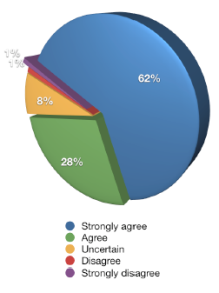
“Is social media important to your business?”
Social Media Is Becoming More Important
Over the course of the last 3 years, Stelzner has seen social media move from an uncertain strategy (2009 report) to a permanent fixture (2010 report) to a primary tool (2011 report) in the savvy marketer’s toolkit.
No-one has benefited more than small businesses.
Ninety percent of those surveyed agreed that social media is important to their business. The report reveals that the self-employed (67%) and small business owners (66%) were more likely to strongly agree with this statement.
Top Benefits for Small Business Owners
Almost all marketers find that social media helps them stand out in an increasingly noisy marketplace. In fact, 88% of all marketers found social media helps get them increased exposure. Additionally, 72% of those surveyed saw increased traffic and subscriptions as a result of social media.
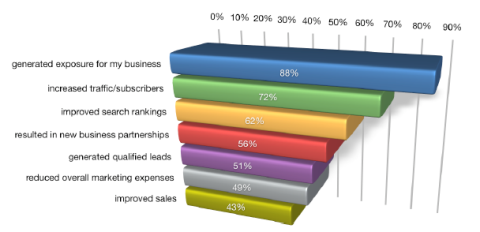
This chart highlights the top benefits identified by all marketers.
Small business owners were more likely than all other groups (89.2% reporting benefits) to see increased exposure.
Here are some other areas where small business owners saw greater benefits than their peers:
- The self-employed and small business owners were more likely to report new partnerships, with at least 59% noting a benefit.
- Small businesses were twice as likely to find qualified leads than other types of businesses.
- Forty-eight percent of self-employed and small business owners saw improved sales as a direct result of their social media efforts.
- The self-employed (59%) and small business owners (58%) were more likely than others to see reductions in marketing costs when using social media marketing.
Time Investment Pays Dividends
Small business owners have many demands on their time. For most of them, marketing is just one of a dozen hats they wear.
Like last year’s report, the 2011 study proved that time is a key success factor for social media marketers. Spend more time (wisely, of course) and you’re likely to see greater results. The question is how much time is required?
This can be answered in two ways:
- The power of endurance—those with 3 or more years of experience in social media marketing are seeing the greatest results. For example, only 25% of those just getting started in social media saw new partnerships form, as compared to 80% or more of those with 3 or more years of experience. So marketers shouldn’t make snap judgments on the value of social media after only a few months. Give it some time!
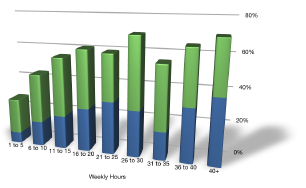
- It doesn’t have to be all-consuming. It may not take as much time as you fear. In fact, 75% of those spending as little as 6 hours per week on social media marketing saw increased traffic.
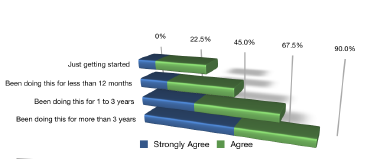
Likewise, those who spend at least 6 hours per week are almost twice as likely to see leads generated as those who spend 5 or fewer hours.

While the study didn’t draw any firm conclusions on how much time marketers should spend, there’s clear evidence that those who commit at least 6 hours per week will see significant rewards for their investment.
What’s in Your Toolkit?
It’s easy for marketers to become enamored by the newest tools, but the industry study showed that almost all marketers have four tools in their toolkit: Facebook, Twitter, LinkedIn and blogs. Two surprises in this year’s study: Facebook surpassed Twitter since the 2010 survey, and MySpace is not being used by at least 81% of marketers.

Some tools that benefit small businesses:

The self-employed (80%) and small business owners (78%) were more likely to use LinkedIn than their counterparts (71%).
The self-employed are the most likely to increase their use of LinkedIn in 2011 (68%) versus 61% for all marketers.
Video Marketing

Seventy-seven percent of all marketers plan to increase their use of video in 2011.
While this is the first choice for all marketers, small businesses lag behind their larger counterparts (82% of large businesses see this as a key growth area).
With all the reports on SEO and engagement benefits from video, I find myself wondering why small businesses aren’t leading the pack here. David Garland and Grant Cowell have shown us that it doesn’t have to be expensive.
Outsourcing for Growth
Only 28% of all marketers outsource any part of their social media marketing. Even though this is a 100% increase over 2010, marketers are still not sure how and when to outsource their social media. This could have to do with the relative inexperience of the audience (50% of the marketers have less than 1 year of experience).
Small business owners are the most likely to use outsourcing (34%), whereas only 24% of the self-employed have utilized outsourcing. Experienced marketers are also more likely to use outsourcing than the less experienced.
Here are the tasks that marketers are outsourcing (percentage shown is out of all surveyed marketers):
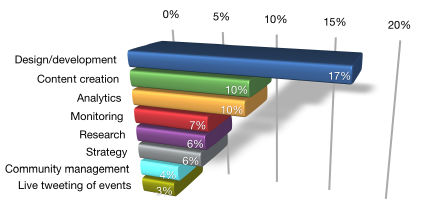
Integrating Social Media With Traditional Marketing Strategies
In a survey that highlights the increasing reach of social media marketing, it’s surprising to see trends that emphasize a growing use of more traditional (online and offline) marketing approaches. For example, at least 64% of all marketers plan to increase their use of search engine optimization and email marketing in 2011.
Here’s how small businesses are using some more traditional marketing tools:
Email Marketing
Nearly two-thirds of all businesses plan to increase their use of email marketing, but small businesses are the most likely of all.
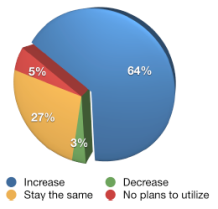
Event Marketing
Sixty percent of all marketers plan to increase their use of event marketing (networking and speaking at conferences and trade shows). Of these, the self-employed (70%) and small business owners (65%) are significantly more likely to participate than marketers from large corporations (43% to 38%, depending on the size of the company).

Press Releases
Eighty percent of all businesses plan to either maintain or increase their use of press releases in 2011. Small business owners are more than twice as likely (52%) to increase their use than businesses with 500 to 1000 employees (24%).
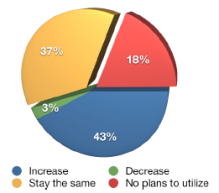
Webinars and Teleseminars
A surprising 42% of all businesses have no plans to utilize webinars or teleseminars in 2011. But small businesses are far more likely to make use of this strategy. In fact, 49% of the self-employed plan on increasing their use compared to 27% of businesses with 500 to 1000 employees.

What Difference Does it Make?
Clearly small business owners are finding great value in social media marketing. In many cases, they’re benefiting more than their large company peers.
Source: Social Media Examiner
You can learn more about social media inside our communication blog.
 English
English
Comments